Saints of the Day
 |
 |
 |
 |
 |
 |
 |
St. Aphraates - April 7
Biographical selection:
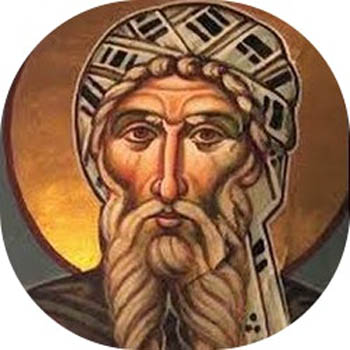 The Roman Martyrology says that he was an anchorite who had the power of the miracles and who defended the Catholic Faith against the Arians in the 4th century.
The Roman Martyrology says that he was an anchorite who had the power of the miracles and who defended the Catholic Faith against the Arians in the 4th century.
Comments of Dr. Plinio:
What were these miracles? How were they worked? What role did they play in the fight against the Arians? These are facts the text does not provide and I lament very much not to know them. It is curious to see a Saint whose particular form of apologetics was to work miracles.
This leads to a question that seems important to me: What is the reason that Our Lady does not give us the power to work miracles against today's progressivists, against the heretics of our times? For, we have neither the power to work miraculous cures nor to make the mountains move or skip like goats as Scriptures mention (Mat 17:19; Ps 113:4,6); nor have we the power to fulminate an enemy of the Church, which is more precious than the power of healing.
You can find contemporary Saints who had this power. For example, during a sermon St. Anthony Marie Claret, declared: "Now the Devil will manifest his ire."
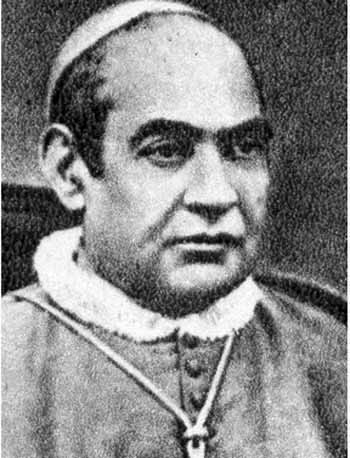 Shortly after he spoke these words, explosive sounds came from the bell tower and the attic of the church, which sent many ladies rushing out of the church in fear. When this Saint was in Cuba, and afterwards in Spain, miracles were numerous. In the life of Dom Bosco miracles were plentiful.
Shortly after he spoke these words, explosive sounds came from the bell tower and the attic of the church, which sent many ladies rushing out of the church in fear. When this Saint was in Cuba, and afterwards in Spain, miracles were numerous. In the life of Dom Bosco miracles were plentiful.
In our poor lives, however, in the life of our counter-revolutionary group, and further, in the lives of the Ultramontane writers of the 19th century, if there one thing that is not present it is miracles. Why is this?
The first very simple answer would be that there are no saints among us: We did not correspond as we should have to the grace. If we had done so, we would work miracles and convert many persons to the Counter-Revolution.
I confess that this explanation seems superficial to me for this reason: If it is true that working miracles is typical in the lives of the Saints, it is not true that working miracles is a requirement to prove that a person is a saint. St. Francis of Sales, for example, was a great Saint and I never heard that he had worked a miracle in his life.
On the other hand, there are persons who were not saints and worked miracles. The Apostles – even Judas – worked miracles during the earthly existence of Our Lord; nonetheless, their behavior was far from saintly in the Garden of Olives…
Miracles and sanctity cannot be classified as synonymous in such a simplistic way.
This does not mean that we are faithful to the grace. Unfortunately, we are unfaithful, but the answer based on this reasoning is not sufficient.
I believe we should take a different approach to find an objective answer.
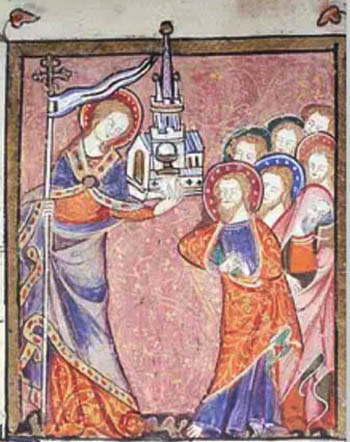 The specific grace the counter-revolutionary receives is a special grace by which he subconsciously has a structure of spirit that corresponds to various metaphysical principles. This special makeup of spirit gives him the possibility to see that the Holy, Roman, Catholic and Apostolic Church is the true Church and that the civil order based on Catholic doctrine is the true civil and temporal order.
The specific grace the counter-revolutionary receives is a special grace by which he subconsciously has a structure of spirit that corresponds to various metaphysical principles. This special makeup of spirit gives him the possibility to see that the Holy, Roman, Catholic and Apostolic Church is the true Church and that the civil order based on Catholic doctrine is the true civil and temporal order.
For this reason the counter-revolutionary, more than other persons, can easily discern the true Faith and see the evil that is in heresy. Moved by the same principles, he readily perceives in the true Faith its more determinant and authentic aspects.
This is a grace that is not refused to anyone and relies, like any grace, on an acceptation of the will. As St. Augustine affirmed, "He who created you without you, will not save you without you." It is through this grace that we have the inestimable gift of the faith. We have this gift in its integrity, in its more refined manifestations, which are the Catholic sense and the spirit of Faith.
What is the Catholic sense? It is an excellence of the virtue of the Faith by which we can easily know the importance, content and architecture of the Catholic Religion. It is a good sense in Catholic matters born from the Faith.
What is the spirit of Faith? It is that excellence, that energy of the Faith by which we securely analyze concrete circumstances under the light of the Faith and not just under the light of the natural principles.
The virtue of confidence, for example, is a fruit of the spirit of Faith. A man can act against the rules of nature or natural wisdom and do things that would be wrong and imprudent if God did not exist; but because of our vocation and the graces we receive, it is normal that we do those things, confiding in God.
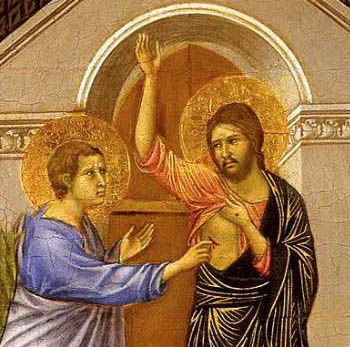 So then, these characteristics give us such clarity on what the True Religion is that we do not need to work miracles. The miracle is not necessary for our sanctification.
So then, these characteristics give us such clarity on what the True Religion is that we do not need to work miracles. The miracle is not necessary for our sanctification.
Someone could ask whether the path of miracles would not be more noble and beautiful for us. I remember a phrase of Our Lord to St. Thomas after he had placed his fingers in Christ's Sacred Wounds: "Thomas, you have believed because you have seen; blessed are those who have not seen but believe." Blessed those who have such a faith that they do not need miracles but walk on the path of Faith! They do not have the spectacular confirmation of the miracle.
Because of this, they are able to understand our great miracle. And what is this miracle? It is the Counter-Revolution itself. People from Europe often come to visit us here in Brazil and are confused by the fact that the vision of Christendom that Europe rejected and considered impossible to be realized, they see accepted by us here and being reestablished through our fight.
At the same time, many of the old generation reject the Counter-Revolution also. The men of that generation had the natural conditions to correspond to the grace of the Counter-Revolution, but only very few of them did so. Allow me to say this with affection and respect: The new generations, which no longer have the natural psychological structure to fight the Revolution, are the ones who responded to this call.
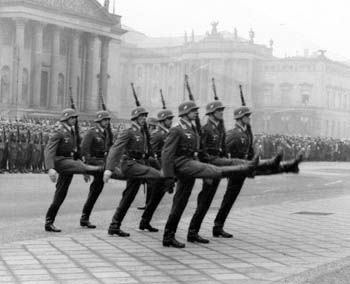 One example: The military men in the time of Kaiser's Germany were able to march using that famous goose step, which became an expression of great discipline. It was admirable to see men marching in that way, but they were men with two normal legs. To have an army of one-legged people marching with the goose step would be something much more complex.
One example: The military men in the time of Kaiser's Germany were able to march using that famous goose step, which became an expression of great discipline. It was admirable to see men marching in that way, but they were men with two normal legs. To have an army of one-legged people marching with the goose step would be something much more complex.
Now then, Our Lady by a superabundance of grace makes the one-legged men of the new generations do what those old generation soldiers could do. She, by the superabundance of her grace, makes persons without capacity or psychological structure, with all kinds of nervous problems, face situations that they would never be able to face.
She invites them to come and be part of the banquet of the King. It is with an army of blind, lame and deaf persons that she makes a Counter-Revolution that everyone would consider impossible. In this fact there is something that is a permanent miracle.
Someone could ask: Would we not convert many more people if we just had the gift of miracles?
I answer with another question: What would be the advantage of having this gift if it were not accompanied by the gift of working another type of miracle, which is a special moral miracle? What would be the worth of a miracle for the man who receives it and says: "I believe in God," but afterwards continues to lead the same life he did before? What would we gain with this miracle?
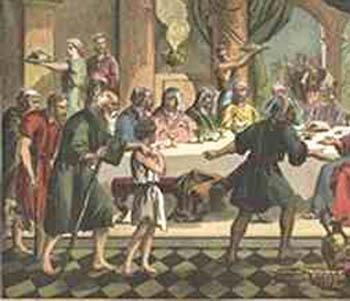 These people would not change with miracles; they will only change with the miracles of the Chastisement. Then, you will see all types of miracles made by God. When the day comes, you see the multitude of miracles that will take place when God punishes mankind in His unfathomable wrath; then you will see what miracles are.
These people would not change with miracles; they will only change with the miracles of the Chastisement. Then, you will see all types of miracles made by God. When the day comes, you see the multitude of miracles that will take place when God punishes mankind in His unfathomable wrath; then you will see what miracles are.
Then these miracles will convert some of those people. It will be the only way to convert them. But these will not be miracles made by us; they will only be witnessed by us.
The grace of having this strong faith that does not need miracles is a grace that Our Lady gives her devotees. This faith is a chastity of soul just as chastity is the projection of the faith on the body.
We must ask Our Lady and St. Aphraates to obtain for us the grace to increase our faith even without miracles. Let this be the miracle realized in us through them: that we, sons of the 20th century, so broken and without foundation, should have an intense spirit of Faith.


The Saint of the Day features highlights from the lives of saints based on comments made by the late Prof. Plinio Corrêa de Oliveira. Following the example of St. John Bosco who used to make similar talks for the boys of his College, each evening it was Prof. Plinio’s custom to make a short commentary on the lives of the next day’s saint in a meeting for youth in order to encourage them in the practice of virtue and love for the Catholic Church. TIA thought that its readers could profit from these valuable commentaries.
The texts of both the biographical data and the comments come from personal notes taken by Atila S. Guimarães from 1964 to 1995. Given the fact that the source is a personal notebook, it is possible that at times the biographic notes transcribed here will not rigorously follow the original text read by Prof. Plinio. The commentaries have also been adapted and translated for TIA’s site.

St. Aphraates or Aphrahat (280-345), the Persian sage
Comments of Dr. Plinio:
What were these miracles? How were they worked? What role did they play in the fight against the Arians? These are facts the text does not provide and I lament very much not to know them. It is curious to see a Saint whose particular form of apologetics was to work miracles.
This leads to a question that seems important to me: What is the reason that Our Lady does not give us the power to work miracles against today's progressivists, against the heretics of our times? For, we have neither the power to work miraculous cures nor to make the mountains move or skip like goats as Scriptures mention (Mat 17:19; Ps 113:4,6); nor have we the power to fulminate an enemy of the Church, which is more precious than the power of healing.
You can find contemporary Saints who had this power. For example, during a sermon St. Anthony Marie Claret, declared: "Now the Devil will manifest his ire."

St. Anthony Marie Claret (1807-1870), a great preacher & miracle worker
In our poor lives, however, in the life of our counter-revolutionary group, and further, in the lives of the Ultramontane writers of the 19th century, if there one thing that is not present it is miracles. Why is this?
The first very simple answer would be that there are no saints among us: We did not correspond as we should have to the grace. If we had done so, we would work miracles and convert many persons to the Counter-Revolution.
I confess that this explanation seems superficial to me for this reason: If it is true that working miracles is typical in the lives of the Saints, it is not true that working miracles is a requirement to prove that a person is a saint. St. Francis of Sales, for example, was a great Saint and I never heard that he had worked a miracle in his life.
On the other hand, there are persons who were not saints and worked miracles. The Apostles – even Judas – worked miracles during the earthly existence of Our Lord; nonetheless, their behavior was far from saintly in the Garden of Olives…
Miracles and sanctity cannot be classified as synonymous in such a simplistic way.
This does not mean that we are faithful to the grace. Unfortunately, we are unfaithful, but the answer based on this reasoning is not sufficient.
I believe we should take a different approach to find an objective answer.

The Virgin Mary, holding the banner of victory & the Church, Queen of the Counter-Revolution
For this reason the counter-revolutionary, more than other persons, can easily discern the true Faith and see the evil that is in heresy. Moved by the same principles, he readily perceives in the true Faith its more determinant and authentic aspects.
This is a grace that is not refused to anyone and relies, like any grace, on an acceptation of the will. As St. Augustine affirmed, "He who created you without you, will not save you without you." It is through this grace that we have the inestimable gift of the faith. We have this gift in its integrity, in its more refined manifestations, which are the Catholic sense and the spirit of Faith.
What is the Catholic sense? It is an excellence of the virtue of the Faith by which we can easily know the importance, content and architecture of the Catholic Religion. It is a good sense in Catholic matters born from the Faith.
What is the spirit of Faith? It is that excellence, that energy of the Faith by which we securely analyze concrete circumstances under the light of the Faith and not just under the light of the natural principles.
The virtue of confidence, for example, is a fruit of the spirit of Faith. A man can act against the rules of nature or natural wisdom and do things that would be wrong and imprudent if God did not exist; but because of our vocation and the graces we receive, it is normal that we do those things, confiding in God.

‘Blessed are those who have not seen but believe’
Someone could ask whether the path of miracles would not be more noble and beautiful for us. I remember a phrase of Our Lord to St. Thomas after he had placed his fingers in Christ's Sacred Wounds: "Thomas, you have believed because you have seen; blessed are those who have not seen but believe." Blessed those who have such a faith that they do not need miracles but walk on the path of Faith! They do not have the spectacular confirmation of the miracle.
Because of this, they are able to understand our great miracle. And what is this miracle? It is the Counter-Revolution itself. People from Europe often come to visit us here in Brazil and are confused by the fact that the vision of Christendom that Europe rejected and considered impossible to be realized, they see accepted by us here and being reestablished through our fight.
At the same time, many of the old generation reject the Counter-Revolution also. The men of that generation had the natural conditions to correspond to the grace of the Counter-Revolution, but only very few of them did so. Allow me to say this with affection and respect: The new generations, which no longer have the natural psychological structure to fight the Revolution, are the ones who responded to this call.

German soldiers marching with the goosestep
Now then, Our Lady by a superabundance of grace makes the one-legged men of the new generations do what those old generation soldiers could do. She, by the superabundance of her grace, makes persons without capacity or psychological structure, with all kinds of nervous problems, face situations that they would never be able to face.
She invites them to come and be part of the banquet of the King. It is with an army of blind, lame and deaf persons that she makes a Counter-Revolution that everyone would consider impossible. In this fact there is something that is a permanent miracle.
Someone could ask: Would we not convert many more people if we just had the gift of miracles?
I answer with another question: What would be the advantage of having this gift if it were not accompanied by the gift of working another type of miracle, which is a special moral miracle? What would be the worth of a miracle for the man who receives it and says: "I believe in God," but afterwards continues to lead the same life he did before? What would we gain with this miracle?

Our Lady invites the blind, lame & weak
to the counter-revolutionary banquet
Then these miracles will convert some of those people. It will be the only way to convert them. But these will not be miracles made by us; they will only be witnessed by us.
The grace of having this strong faith that does not need miracles is a grace that Our Lady gives her devotees. This faith is a chastity of soul just as chastity is the projection of the faith on the body.
We must ask Our Lady and St. Aphraates to obtain for us the grace to increase our faith even without miracles. Let this be the miracle realized in us through them: that we, sons of the 20th century, so broken and without foundation, should have an intense spirit of Faith.

 | |
|
|
The texts of both the biographical data and the comments come from personal notes taken by Atila S. Guimarães from 1964 to 1995. Given the fact that the source is a personal notebook, it is possible that at times the biographic notes transcribed here will not rigorously follow the original text read by Prof. Plinio. The commentaries have also been adapted and translated for TIA’s site.


